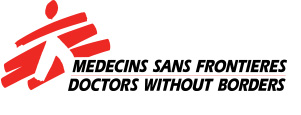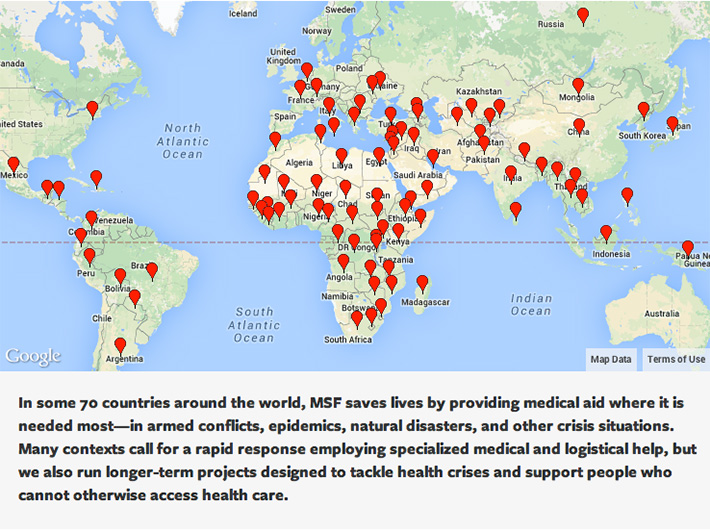Every year, Doctors Without Borders/Médecins Sans Frontières (MSF) provides emergency medical care to millions of people caught in crises in some 70 countries around the world. MSF provides assistance when catastrophic events—such as armed conflict, epidemics, malnutrition, or natural disasters—overwhelm local health systems. MSF also assists people who face discrimination or neglect from their local health systems or when populations are otherwise excluded from health care.
MSF is a neutral and impartial humanitarian organization that aims first and foremost to provide high-quality medical care to the people who need it the most. It does not promote the agenda of any country, political party, or religious faith, and, as such, endeavors to communicate its history, background, and capabilities to all parties in a given situation so that it may gain the necessary access to populations in need.
On any given day, more than 30,000 doctors, nurses, logisticians, water-and-sanitation experts, administrators, and other qualified professionals working with MSF can be found providing medical care around the world.
In 2012, MSF medical teams carried out more than 8.3 million outpatient consultations; delivered more than 185,000 babies; treated more than 1.6 million people for malaria; treated nearly 350,000 severely and moderately malnourished children; provided some 284,000 people living with HIV/AIDS with antiretroviral therapy; conducted more than 78,000 surgeries, and vaccinated 690,000 against measles and 496,000 against meningitis.
When MSF Responds
At its core, the purpose of humanitarian action is to save the lives and ease the suffering of people caught in acute crises, thereby restoring their ability to rebuild their lives and communities.
In the countries where MSF works, one or more of the following crises is usually occurring or has occurred: armed conflict, epidemics, malnutrition, natural disasters, or exclusion from health care.
Armed Conflict
In numerous countries, MSF is providing medical care to people caught in war zones. Some may have been injured by gunfire, knife or machete wounds, bombings, beatings, or sexual violence. Others are cut off from medical care or denied the ability to seek the treatment they need. This could be a pregnant woman who cannot reach help to deliver her baby, or someone with a chronic condition who has no way to resupply his medicines. Conflict’s consequences are manifold, and MSF has historically attempted to respond with speed, focus, and flexibility in order to deliver the necessary care to those most in need.
In 2012 and 2013, MSF provided surgical care in approximately two dozen countries, including the Democratic Republic of Congo, Syria, Haiti, Nigeria, Iraq, South Sudan, Somalia, and Jordan, among other countries. MSF also provided medical care to refugees and internally displaced people seeking sanctuary in camps and other temporary shelters.
Today, in numerous countries around the globe, MSF teams are running vaccination campaigns and water-and-sanitation projects, providing basic medical care through clinics and mobile clinics, building or rehabilitating hospitals, treating malnutrition and infectious diseases, and providing mental health support. Field teams also provide shelter and basic supplies—blankets, plastic sheeting, cooking pots, and more—when people have been uprooted from their homes and have nothing to help them survive.
Epidemics
MSF has a long history of responding to epidemic outbreaks of cholera, meningitis, measles, malaria, and other infectious diseases that spread rapidly and can be fatal if not treated.
Over the past decade, MSF has also become involved in the treatment of the devastating pandemics of HIV/AIDS and tuberculosis (TB), which is the leading cause of death for people with HIV/AIDS. MSF also treats neglected diseases such as kala azar, sleeping sickness, and Chagas, diseases that largely affect the world's poorest people and for which there are, at present, few effective treatment options. Furthermore, MSF treats and advocates for people afflicted with drug-resistant and multi-drug resistant forms of TB that require lengthy, difficult treatment regimens.
MSF believes in bringing the highest quality medical care possible to its patients. Through the Access Campaign, MSF pushes for improved diagnostics and treatments for diseases that disproportionately affect the world's poor, along with urgently needed second-line drugs for the growing numbers of patients developing resistance to first-line medicines. MSF has also called attention to the need for appropriate pediatric formulations for children with HIV/AIDS, and improved treatments and diagnostics for tuberculosis, for which there have been virtually no new advances in treatment since the 1960s.
In 1999, MSF co-founded the Drugs for Neglected Diseases initiative (DNDi) which brought together drug researchers, medical practitioners, and pharmaceutical companies to explore alternative ways of developing medicines—basing research and development priorities on need rather than profit. In 2007, DNDi and the pharmaceutical company sanofi-aventis launched ASAQ, an effective and easy-to-use treatment for malaria. More recently, MSF and DNDi worked to develop and implement the first viable new treatment for sleeping sickness in a quarter of a century, nifurtimox-eflornithine combination therapy (NECT), and they are now working to find and clinically test a new drug to treat Chagas disease.
|
In recent years, MSF has responded to measles epidemics in several countries (particularly in Central and West Africa), a dengue fever outbreak in Honduras, kala azar outbreaks in South Sudan and elsewhere, and a widespread outbreak of cholera in Haiti, where the organization treated more than 60 percent of all the cases that presented in the country, and on the border between Guinea and Burkina Faso, where teams showed the efficacy of using cholera vaccines after outbreaks had begun. MSF also supported the governments of Niger and Mali as they implemented the use of a new, low-cost and longer-lasting vaccine for meningitis A.
Malnutrition
An estimated 195 million children worldwide suffer from the effects of malnutrition, with 90 percent of them living in sub-Saharan Africa and South Asia. In fact, malnutrition contributes to at least one-third of the eight million annual deaths of children under five years of age.
In 2012, MSF treated approximately nearly 350,000 severely and moderately malnourished children in a host of countries in Africa and Asia. In many cases, teams employed ready-to-use therapeutic food, or RUTF, a revolutionary product that is changing protocols for responding to malnutrition. These nutrient-dense milk- and peanut-based pastes include all the minerals, vitamins, and nutrients that rapidly growing young children need for proper development. In traditional treatment programs, severely malnourished children had to be hospitalized for several weeks to receive treatment. The fact that several weeks worth of RUTF can be given to families and then taken at home means that far more children can be treated than ever before.
In 2010, MSF teamed with VII Photo Agency to launch the “Starved for Attention” multimedia campaign. The ongoing campaign has already been shown in several American, European, and African cities and featured in numerous media outlets. In pictures and video, it exposes the neglected and largely invisible crisis of childhood malnutrition and urges countries making the largest contributions to food assistance to supply the right foods and adequate resources for nutrition programs in the most-affected countries.
Natural Disasters
Natural disasters can overwhelm a local or national health structure in a matter of minutes. There are times when the aftermath of monumental disasters requires more of a development and reconstruction focus than a medical one. This was the case after the Indian Ocean tsunami in 2005, when other organizations and government agencies had the necessary capacities to address the most pressing needs and there actually was not much for MSF to do.
In numerous instances, however, MSF played a large role in tending to the wounded and the ill who were left in a catastrophe’s wake. In several situations, MSF teams were already present in a place when disaster struck and were thus able to respond quickly. This was the case when the Kashmir region of Pakistan and India was hit by a devastating earthquake in 2005, when flooding swamped Mexico in 2007, and when cyclones thrashed Bangladesh in 2007 and Myanmar in 2008. MSF teams were able to rapidly assess where their expertise would be of most assistance and set up primary and secondary care health facilities, surgical units, and mobile clinics to reach people trapped in remote areas.
More recently, MSF launched what became the organization’s largest-ever emergency effort following the January 2010 earthquake that devastated Haiti, killing more than 200,000 people and leaving more than a million homeless. MSF also launched relief efforts following widespread flooding in Pakistan and, in late 2013, Typhoon Haiyan in the Philippines.
Exclusion from Health Care
In many parts of the world, certain groups—refugees, internally displaced people, migrants, minorities, the unemployed, prisoners, people with HIV/AIDS or tuberculosis, drug users, sex workers, street children and others—are marginalized and prevented from accessing adequate health care simply because of who they are. They may fear stigma and be reluctant to seek help, or their health care system may deliberately neglect or exclude them.
In these instances, MSF tries to bridge the gap in services and call on governments to make sure that all of the people for whom they bear responsibility can get the treatments they need. In places such as Bangladesh and Honduras, MSF medical teams provide medical, social, and mental health care to those affected by institutional neglect and advocate with local and national governments and civil society for improved access to services and increased social acceptance for their patients.
|



